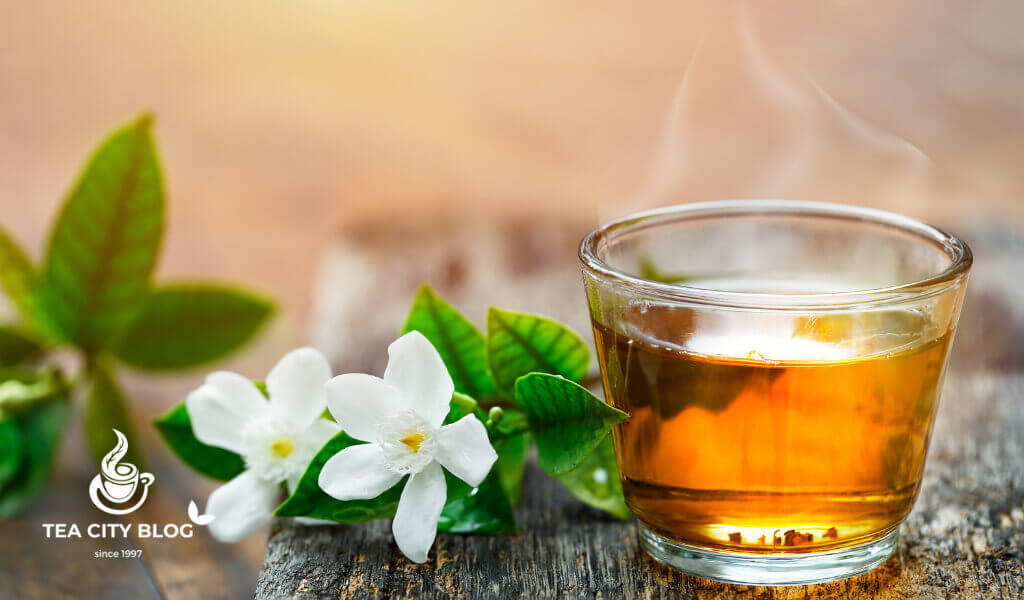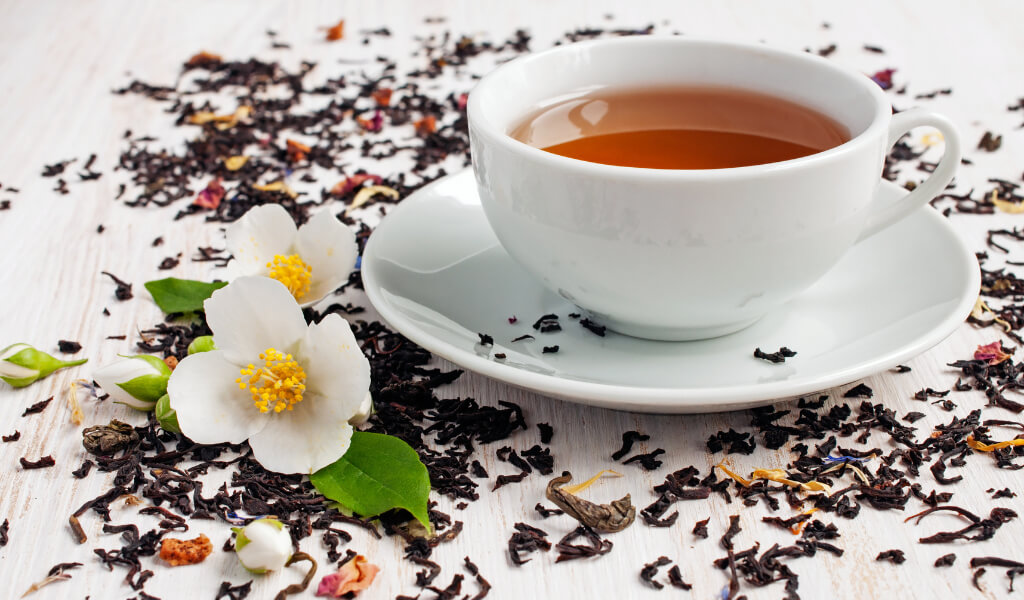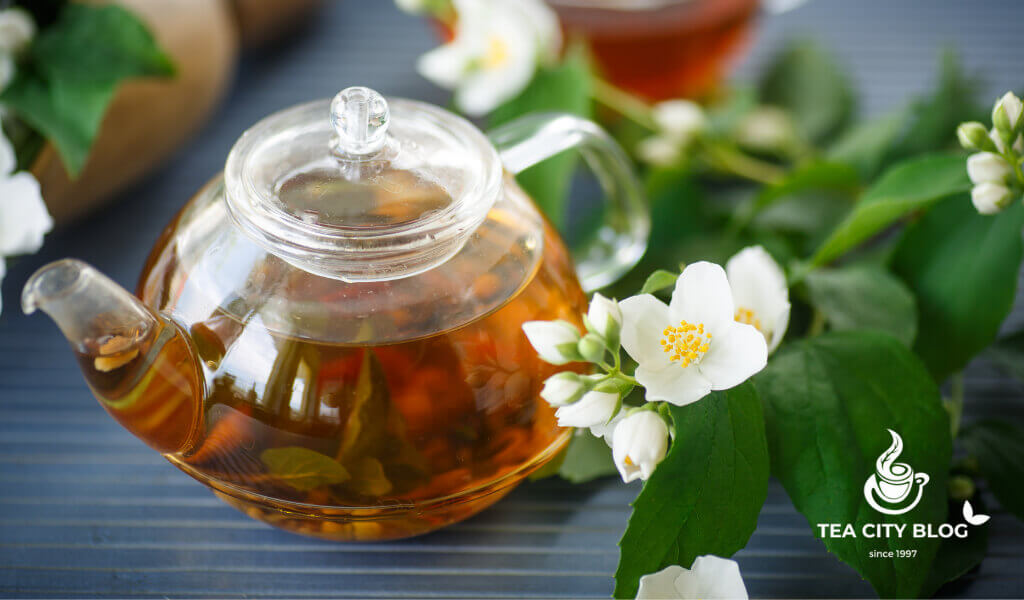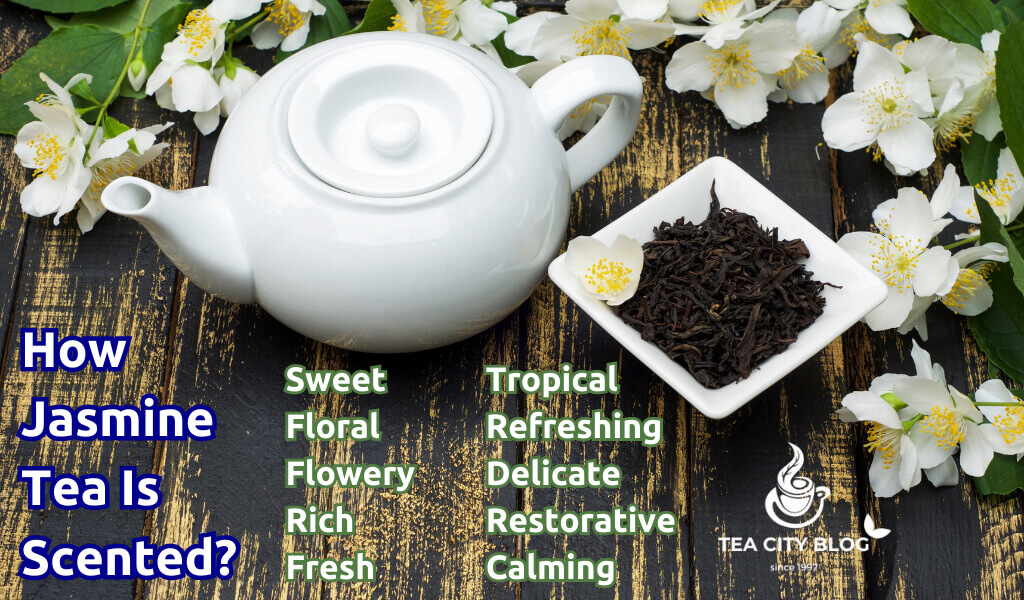what does Jasmine tea taste like? That’s the question on many tea enthusiasts’ minds. Well, we’re here to answer that for you!
In this post, we’ll examine the world of Jasmine tea and its flavor profile to see if it’s worth adding to your tea collection.
Quotes of tea at Today
“I greet you as guests and so will not crush the life from you and devour your souls with peals of laughter.
No, instead I will make some tea.”
― Steven Erikson
What does jasmine tea taste like?
The taste of Jasmine tea can differ based on the type of tea it is made from, where it is grown, and how it is processed. Generally, jasmine tea has a sweet and flowery flavor and scent that balances out the bitterness of its blended tea.

The taste is quite delicious and refreshing, with a floral note that’s both pleasant and calming. However, some people might find the scent of Jasmine overpowering, so the taste may only be for some. Whether you like jasmine tea is subjective and depends on personal preference. If you’re curious, try the Aroma of jasmine tea to see if it’s your cup!
Why do people drink it?
Jasmine tea is a type of tea that is commonly enjoyed as a beverage, just like regular tea. Jasmine tea have caffeine, which makes it a good choice for those who need a little boost. Even before drinking the tea, the aroma of jasmine can have a relaxing effect on people. Tea may generate a nice scent that might help people relax.
If you want to learn more about jasmine tea or read reviews, visit the jasmine tea category on Bee and Basil. It explains the many varieties of jasmine tea, how it’s manufactured, and some of the special advantages of the jasmine smell.
How does jasmine tea taste?
The taste profile of Jasmine tea typically has a gentle and fragrant taste, with a delicate floral flavour and a hint of sweetness. The flavor punch of your cuppa can pack a subtle or strong punch, depending on the scenting process, brewing method, and type of tea used as the base.
Here are some words to describe the delicious taste of jasmine tea:
- Sweet
- Floral
- Flowery
- Rich (if made with oolong tea base)
- Fresh
- Tropical
- Refreshing
- Delicate
- Restorative
- Calming
- Slightly astringent or bitter (if made with black or green tea bases)
Several scenting techniques are employed to blend jasmine with tea leaves:
Natural Scenting
To give tea leaves a natural scent of jasmine, the buds are picked before they fully open and placed under a woven tray of loose tea leaves.
Over a few days, the jasmine buds gradually open up, releasing their oils into the tea leaves. This process is repeated several times to ensure the perfect floral fragrance and sweetness balance. The result is a delicate and refreshing taste that will delight your senses.
Making Jasmine Pearls
When making jasmine pearls tea, the tea and jasmine buds are carefully layered and rolled by hand until they resemble little pearls.
This unique process helps the essential oils from the jasmine to infuse the tea leaves, resulting in a truly unique flavour profile that is bold and rich.
You’ll immediately notice the intensely floral taste, complemented by a refreshing spring-like quality.
If you’re looking for the best jasmine tea 2023, look no further than jasmine pearls tea – it’s the highest-quality option.
How strong is the flavor of Jasmine Tea?
The fragrance of jasmine tea is known for its distinct flavour and aroma. Several factors, such as the scenting process, the ratio of jasmine buds to tea leaves, and the brewing time, influence these qualities’ strength.
You can opt for a subtle and delicate jasmine tea with a milder taste. On the other hand, if you enjoy a more powerful jasmine flavour, you can choose an aromatic, fragrant tea with floral notes. For a stronger tea, jasmine pearl tea is usually the top pick.
How to make jasmine tea better?
Jasmine tea of good quality is produced using the flower buds of the jasmine plant. If you want to enhance the taste of your Jasmine tea, try adding some sugar or honey. It will surely make it even more delightful!
And:
- Use high-quality tea leaves: The quality of the tea leaves can significantly affect the taste of the tea. Look for high-quality Jasmine tea leaves that are fresh and fragrant.
- Use the right water temperature: Jasmine tea should be brewed at a lower temperature (around 175°F/80°C) to avoid bitterness. Boiling water can make the tea taste too strong and bitter.
- Steep for the right time: Oversleeping can make the tea taste too strong and bitter. Steep Jasmine tea for 2-3 minutes and remove the tea leaves.
- Add natural sweeteners: You can add natural sweeteners like honey or agave to enhance the flavor of the jasmine tea.
- Add citrus: Adding a slice of lemon or lime to Jasmine tea can add a bright and refreshing flavour.
- Experiment with different flavours: Adding herbs or spices like mint, ginger, or cinnamon to your Jasmine tea to create your unique flavor profile.
Tips for drinking jasmine tea
1. Making Tea
To enjoy full jasmine green tea benefits, it’s best to brew it in a clear glass cup with water boiled to around 90°C. The Tea should steep for about 3-5 minutes and can be brewed 2-3 times.
As you brew, you can admire the beautiful and unique shape of the tea through the glass. In Sichuan, the Gaiwan brewing method is popular for scented Tea. It comes with a tea bowl, saucer, and lid, and each person can make their cup, sipping and tasting as they go and arranging them in a “Longmen Array.”
2. Smelling the Aroma
After the jasmine tea has been brewed and allowed to sit, you can lift the cup, uncover the lid slightly, and take a whiff of the fragrant steam. The aroma will waft up to your nose, providing a delightful sensory experience. If you want to savor the aroma, take a deep breath and enjoy the full, pleasant sensation.
3. Tasting the Tea
Once you’ve savored the aroma, take small sips when it’s cooled down and ready to drink. Savor the tea by holding it in your mouth and using your breath to circulate the flavors across your tongue and into your senses. Repeat this process around 12 times before swallowing to appreciate the taste of the tea leaves and aroma fully.
This is known as a “mouth product.” There’s a saying among tea enthusiasts that “one sip is for drinking, three sips are for tasting” when enjoying jasmine tea.
4. Enjoying the Tea
If you have a glass cup, you can enjoy watching the graceful dance of the tea leaves as you sip and savor the aroma and taste.
This is especially true for high-quality jasmine tea with a unique shape made through skilled craftsmanship. So take your time and enjoy the sensory experience of drinking jasmine tea in a glass cup.
Does jasmine tea have the same composition as green tea?
In fact, is jasmine tea green tea? The answer is tea is a beloved beverage worldwide and has been enjoyed for centuries.
So, what does jasmine milk tea taste like? If you’re new to herbal teas, Jasmine Tea may be a better starting point due to its gentle taste, while Green Tea tends to be quite strong. Green tea comes in various types, such as Matcha and specially blended green teas. You may also use it to make coffee less acidic.
Tea Base
The taste of jasmine tea is primarily influenced by its tea base.
Green tea is the most widely used tea basis for jasmine tea because it yields a delicate and well-balanced flavor by fusing the essence of green tea leaves with jasmine blooms.
Jasmine green tea offers a delicate floral flavor and sweet and fresh notes, which many tea lovers find appealing. It falls somewhere between jasmine black tea and white jasmine tea in terms of taste intensity.
On the other hand, jasmine black tea is made using black tea as the base, resulting in a solid and rich flavor with a hint of floral aroma.
Article owned by spiriteadrinks.com
FAQs
Can you detect a Jasmine-like scent in Jasmine Tea?
You’re asking whether the jasmine flower used in cooking tastes precisely like the ones you find in drinks. Well, not really. The fresh jasmine flower used for cooking can be bitter, but you’ll still get that flowery flavor in your drink. I hope that helps!
How does sweetener affect the taste of Jasmine tea?
If you find jasmine tea a bit bitter, don’t worry – you can always add a sweetener! While some people enjoy it as is, adding a bit of sugar or honey can help bring out its natural sweetness and floral flavors.
What is jasmine tea similar to?
Jasmine tea is a unique brew with a floral profile similar to orange blossoms or gardenia. Its distinctive flavor, which is rich and evocative of these delicate blooms with a background of green tea, sets it apart from other teas.
Does jasmine tea taste the same as green tea?
While jasmine tea is often based on green tea, its taste isn’t the same. This tea differs from the conventional vegetal or grassy tones of green tea by having a distinctive, fragrant flavor infusion from jasmine blossoms.
Is jasmine tea sweet or bitter?
Jasmine tea is typically more sweet than bitter. It boasts a subtle sweetness due to the infusion of jasmine flowers, while any slight bitterness would usually be attributed to the green tea base, depending on its quality and brewing process.
Is jasmine tea naturally sweet?
Yes, jasmine tea is naturally sweet. This sweet profile comes from the jasmine flowers used during the infusion process. The natural sweetness of the flowers transfers to the tea, giving it a gently sweet and aromatic flavor.
Do you put milk in jasmine tea?
Typically, jasmine tea is enjoyed without milk to preserve its delicate floral flavor and aroma. Adding milk could overpower the subtle notes of jasmine, altering its unique profile.
I’m Shanna, creator of Spiritea Drinks. I’m all about teaching people to grow their own food, tea, cook what they harvest, and eat with the seasons.



